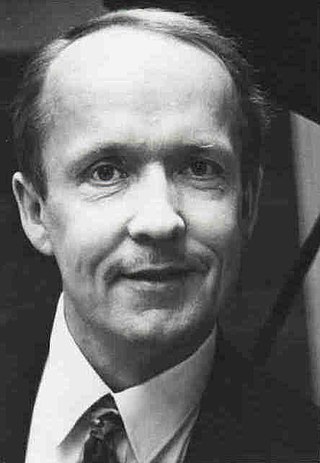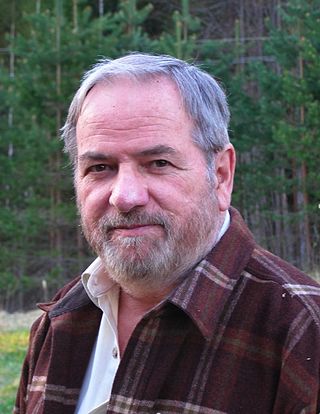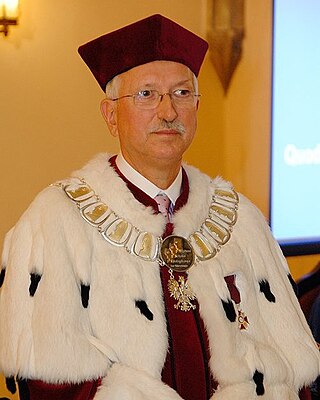Semiotics is the systematic study of sign processes and the communication of meaning. In semiotics, a sign is defined as anything that communicates intentional and unintentional meaning or feelings to the sign's interpreter.
Charles William Morris was an American philosopher and semiotician.

Juri Lotman was a prominent Russian-Estonian literary scholar, semiotician, and historian of Russian culture, who worked at the University of Tartu. He was elected a member of the British Academy (1977), Norwegian Academy of Science and Letters (1987), Royal Swedish Academy of Sciences (1989) and Estonian Academy of Sciences (1990). He was a founder of the Tartu–Moscow Semiotic School. The number of his printed works exceeds 800 titles. His archive which includes his correspondence with a number of Russian and Western intellectuals, is immense.
Biosemiotics is a field of semiotics and biology that studies the prelinguistic meaning-making, biological interpretation processes, production of signs and codes and communication processes in the biological realm.
Zoosemiotics is the semiotic study of the use of signs among animals, more precisely the study of semiosis among animals, i.e. the study of how something comes to function as a sign to some animal. It is the study of animal forms of knowing.

Eero Aarne Pekka Tarasti, is a Finnish musicologist and semiologist, currently serving as Professor Emeritus of Musicology at the University of Helsinki.

Jean-Jacques Nattiez is a musical semiologist or semiotician and professor of musicology at the Université de Montréal. He studied semiology with Georges Mounin and Jean Molino and music semiology (doctoral) with Nicolas Ruwet.

Thomas Albert Sebeok was a Hungarian-born American polymath, semiotician, and linguist. As one of the founders of the biosemiotics field, he studied non-human and cross-species signaling and communication. He is also known for his work in the development of long-time nuclear waste warning messages, in which he worked with the Human Interference Task Force to create methods for keeping the inhabitants of Earth away from buried nuclear waste that will still be hazardous 10,000 or more years in the future.

Solomon Marcus was a Romanian mathematician, member of the Mathematical Section of the Romanian Academy and emeritus professor of the University of Bucharest's Faculty of Mathematics.
Dick Hebdige is an expatriate English media theorist and sociologist, and a professor emeritus of art and media studies at the University of California, Santa Barbara, where he taught from 2004 to 2021. His work is commonly associated with the study of subcultures, and its resistance against the mainstream of society. His current research interests include media topographies, desert studies, and performative criticism.

Boris Andreevich Uspenskij is a Russian linguist, philologist, semiotician, historian of culture.

Vyacheslav Vsevolodovich Ivanov was a prominent Soviet/Russian philologist, semiotician and Indo-Europeanist probably best known for his glottalic theory of Indo-European consonantism and for placing the Indo-European urheimat in the area of the Armenian Highlands and Lake Urmia.
Francesco Casetti is an Italian naturalized US citizen film and television theorist. He is Sterling Professor of Humanities and Film and Media Studies at Yale University. He has been described as "the best analyst of cinematographic enunciation."

John Deely was an American philosopher and semiotician. He was a professor of philosophy at Saint Vincent College and Seminary in Latrobe, Pennsylvania. Prior to this, he held the Rudman Chair of Graduate Philosophy at the Center for Thomistic Studies, located at the University of St. Thomas (Houston).
Henryk Baran is a scholar, author, and professor currently at the State University of New York, Albany (SUNY) holding a position in the Department of Languages, Literature & Culture. He is particularly immersed in the Russian language and culture. He is also an authority on the 'career' of Protocols of Zion in the former Russian Empire.
Leonidas Donskis was a Lithuanian-Jewish philosopher, political theorist, historian of ideas, social analyst, and political commentator, professor of politics and head of "VDU Academia Cum Laude" at Vytautas Magnus University, Honorary Consul of Finland in Kaunas and deputy chairman of the Lithuanian Jewish Community. He was also the member of the European Parliament (MEP) from 2009 to 2014.
Robert Hodge is an Australian academic, author, theorist and critic. While best known as a semiotician and critical linguist, his work encompasses a wide, interdisciplinary range of fields including cultural theory, media studies, chaos theory, Marxism, psychoanalysis, post-colonialism, post-modernism and many other topics both within the humanities as well as science. He is currently a professor at the University of Western Sydney.

Zdzisław Wąsik is a Polish linguist and semiotician, Rector Senior and Professor Ordinarius at the Philological School of Higher Education in Wrocław and Professor Senior at Adam Mickiewicz University in Poznań.
The International Semiotics Institute is an international research institute, devoted to the study and dissemination of semiotics and interdisciplinary studies. Activities include research, publications, academic events, teaching, consultations, training and supervision, but also extra-academic projects focused on social progress and sustainability.

Paolo Fabbri was an Italian semiotician.









